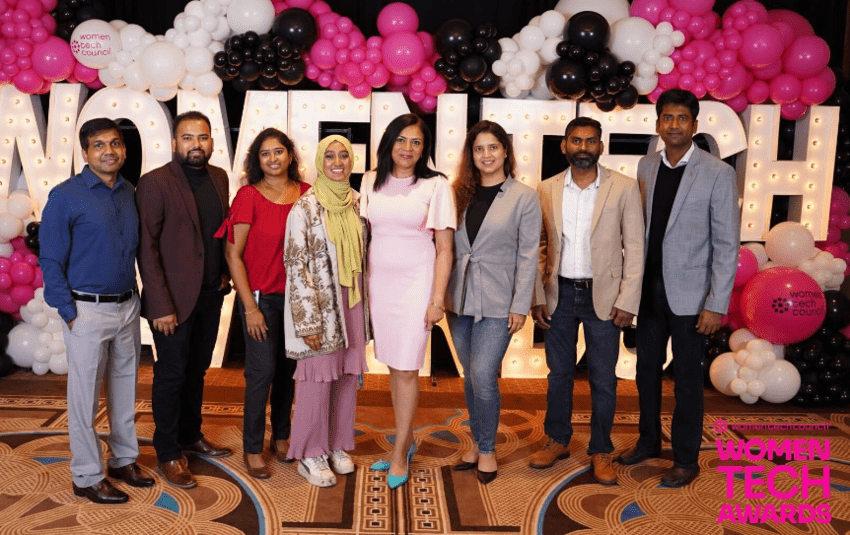

We all aspire to become and be someone. As a young woman stepping into my future, I’m driven by the desire not just to succeed, but to create lasting, meaningful change. I want to shape the world in ways that uplift others, leaving a positive impact that resonates far beyond my own journey. Whether through innovation, leadership, or supporting those around me, my goal is to be a force for good in both my community and the larger world. That world around me as a young college student has expanded over the past year as I have been given the privilege to work as the Program Manager of the Women Tech Council.
I asked a mentor Cydni Tetro which educational steps I should take in order to succeed in my desired vocation. The next day she texted me offering me a position with the Women Tech Council. I had never considered it to be a possibility. Two days after my simple question led to the beginning of career in the tech industry. The very first event I attended was the annual Women Tech Awards. I was completely overwhelmed by the diversity of the audience and the people this community brought together. Because I had so recently joined the team a week earlier I had not the slightest understanding of the process of becoming just one of the women being recognized at that event.
Now, a year has passed since my first Women Tech Awards. Over this time, I’ve witnessed firsthand the dedication, innovation, and passion it takes to become one of these finalists. With the Women Tech Awards on October 3rd, I’d like to spotlight one of the incredible women who was recognized last year.
I sat down with Jaswandi Sakpal, Director of Engineering-Global Services at American Express in Salt Lake City.

From the beginning of her career as Java developer to now an accomplished technology leader at a rapidly growing engineering team at American Express, Sakpal is a living testament to the potential that lies within every woman, and a reflection of the strength and support that surrounds her.
Sakpal is quick to give credit to the remarkable women who have shaped her life, namely, her grandmother, mother, and mother-in-law. In tracing my own family lineage, I have discovered empowered women who defied societal norms and blazed their own trails: my grandmother who taught girls during British Rule in India; my maternal grandmother who managed a business, showcasing her competence in a male-dominated industry; and my mother who navigated the responsibilities of marriage and motherhood while completing her education.

Raised in a family that values the empowerment of women and education, I have forged my path and achieved personal growth. Being the first girl engineer in the family, and moving across the continents for my career, I have moved mountains to embrace my path. For me, my achievement lies in honoring their legacy and showcasing the positive impact Women Role models can have on future generations. My aspirations revolve around three core pillars: family, community, and education. I have integrated these pillars into my life's journey through professional and personal endeavors, mentoring young graduates, encouraging children's participation in tech events, and contributing to grassroots initiatives like the Indian Food Fair.
Jaswandi Sakpal attributes her understanding of the importance of education to her family. She determined that she loved math, but she didn’t want to be a traditional math educator. Instead, she wanted to be an architect or an engineer. Computer science/ engineering especially piqued her interest.

“I started my career as a software developer, an individual contributor. It has been a lot of hard work and persistence. I have been in my career for a long time. Saying yes to opportunities and having good mentors has been really important. Whenever there was an opportunity that came across, I went ahead and said yes, even if I knew that it might be something I have not done before. It helped me grow in my career. Having the support of your family matters a lot because work is just one part of your whole life. You have to have a balance of work, life, and family. When they all come together, it's much easier to get to where you want to go.”
I asked Sakpal her thoughts on getting high school girls engaged in engineering?
“SheTech is a really good platform,” she replied. “I am really glad to see what SheTech is doing. It is definitely helpful. Very few women were in engineering when I got into tech. Most were in HR or on the Marketing side of the business. As I grew in my career it was important for me to find mentors who were supportive of me. And then I went ahead and became one. I learned it is important to give a voice to the team member who is the only girl in the room.”

Sakpal said organizations like Women Tech Council and SheTech encourage women to be a part of the tech industry.
I asked what advice she has for young girls.
“If I were to talk to young girls about pursuing their dreams, I would tell them to go for it!” said Sakpal. “The sky's the limit. Just do it. We as women need to step forward to do it. Nobody else is going to do it on our behalf. We have to do it for ourselves and for future generations.”
I asked her what she has done to change the corporate culture over her career to give women have more of a voice in the workplace.

“For me the first thing was to take that fear out of myself that I have a woman, and that I could not speak up,” said Sakpal.
She continued, “That was the fear I felt for a long time being surrounded by male colleagues most of the time, but then I also never used my being a woman as an excuse not to work. I have done night shifts when required. I have traveled across different continents when required. That's where having family support is very important. We have to be ready to take opportunities when they come.”

We also discussed the importance to encourage female colleagues to share their voice. Sakpal mentioned a technique she uses: “Sometimes introverted and shy persons need to be given a prompt. I will look out for them and say ‘Hey, by the way, what do you think?’ and put them in the spotlight. It is uncomfortable at first, and then they realize that I am not trying to put them down but to hear their thought processes.”
We discussed Sakpal’s love of math. I asked her how that started.
“I would say it was in the sixth or seventh grade. That's when I kind of started liking math,” said Sakpal.
She added, “I give a lot of credit to my teachers during that time. At that age school kids don’t know how they would ever use math. Teachers can change that. They can showcase what people can do with math. I remember my teacher showing us how math could be used to create a city plan. He showed us how angles impact the design of streets. That’s when math stuck with me. I tried other things, art and music, but I was never very good at them. My creativity flew with math, and that's when I knew I wanted to pursue a career involving math.
She continued to describe how her love of math deepened in high school when she became familiar with advanced math topics and started to consider engineering or architecture as a career path. “In high school, subjects will start making impressions. And that's when you will realize you have a passion for something.”

Sakpal said a lot of people get scared of math because they don't understand its practicality. “when you look at math’s practical applications, and where you can use it, it gets pretty fascinating.”
Sakpal’s closing advice to young people considering a career in STEM: “Go for it. Don't restrict yourself with what you think is around you. What is around you are not your limitations. You can do whatever you want. You can have family and career if you choose not to have family. If you choose not to have a career, that's okay, too. Everybody has a place in this world, and we all are required to do our best.”
For more information about the Women Tech Awards that is taking place tomorrow, October 3, 2024, click here.

